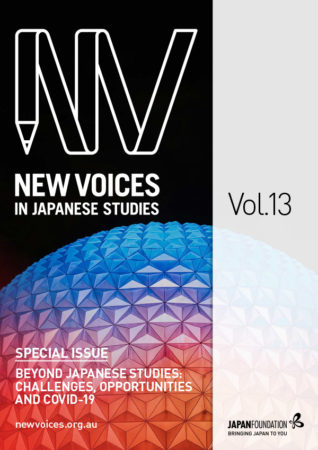
Volume 13
Guest Editor: Gwyn McClelland,
University of New England
Published September, 2021
ISSN 2205-3166
https://doi.org/10.21159/nvjs.13
© The Japan Foundation, Sydney, 2021

Area studies has been described as having lost its significance and legitimacy in the 21st century globalised world. However, research has shown that the strengths of area studies—empirical research and context-sensitive knowledge—remain relevant not only in helping us to understand our contemporary world, but also in challenging the hegemony of theories and concepts developed in Euro-American contexts that have come to dominate both academic and general writing. In this paper, I draw on my research on the transgender community in Japan—an area of study that is relegated to the margins of both Japanese studies and trans studies—to show how the tools of area studies play an important role in expanding the conceptual boundaries of trans studies, and how the lens of transgender can expand or complicate existing knowledge on the culture and society of Japan. I highlight how Japanese transgender identities and cultures are shaped not only by global processes, but also legal, medical, cultural and social conditions specific to Japan. I argue against the assumed universal applicability of Eurocentric conceptualisations of gender/sexual non-conformity, and in doing so I call attention to the ways in which the fields of transgender studies and Japanese studies can enrich each other. More than ever in these precarious times, we need to emphasise the strengths and overcome the weaknesses of our field(s), so that we may be better equipped to turn marginality into possibility.
Much has been written about Japanese law within the context of Japan. Less is known about the application of Japanese legal models outside Japan. A prevailing view among some commentators is that Japanese law scholarship does not offer insights that are useful beyond Japan-based legal studies. Other scholars challenge this perception by invoking Japan’s legal development aid projects in the Mekong subregion of ASEAN—especially in Vietnam, Cambodia and Laos. These projects have been in operation for over twenty years and aim to foster the economic growth of host countries. This article aligns with the view that Japanese law exists beyond, and is influential outside, Japan. It calls for further action by legal specialists to re-examine and re-assess the corresponding influence of Japanese positive law in these countries, both in improving the transparency of those legal systems and enhancing communication among local, comparative and Japanese law experts.
This article, through a series of provocations and anecdotes from my research into dietary health in early modern Japan (1600-1868), makes the case for transhistorical thinking as a productive analytical mode, allowing the past to speak to present concerns in creative and unexpected ways. As this volume seeks a fresh approach to Japanese Studies post-pandemic, addressing this tension between past and present, I argue, offers a productive way to turn the challenges of COVID-19 into opportunities for greater impact and interconnection. Now, however, is a bad time to question science. Vaccine hesitancy, resistance to mask mandates, and the overall politicization of commonsense health guidelines among a substantial plurality of the population indicate a sustained mistrust of health science expertise precisely when belief and compliance would do the most medical and social good. Doing the history of health in Japan through a transhistorical lens, I argue, exposes how a set of social divisions and challenges that may appear through a presentist lens to be as novel as the virus itself, and tied inextricably to the demands and paradoxes of modern state-based public health regimes, are in fact variants of issues that have been faced in dramatically different historical circumstances. This article follows these themes through three broad provocations that resonate between health’s past and present, drawn from the nineteenth-century history of diet and nutrition in Japan: skepticism of doctors and a critique of medical expertise; prioritising preventative versus retroactive care; and balancing health with opening the economy.
DISCUSSION PAPERS
REVIEWS
